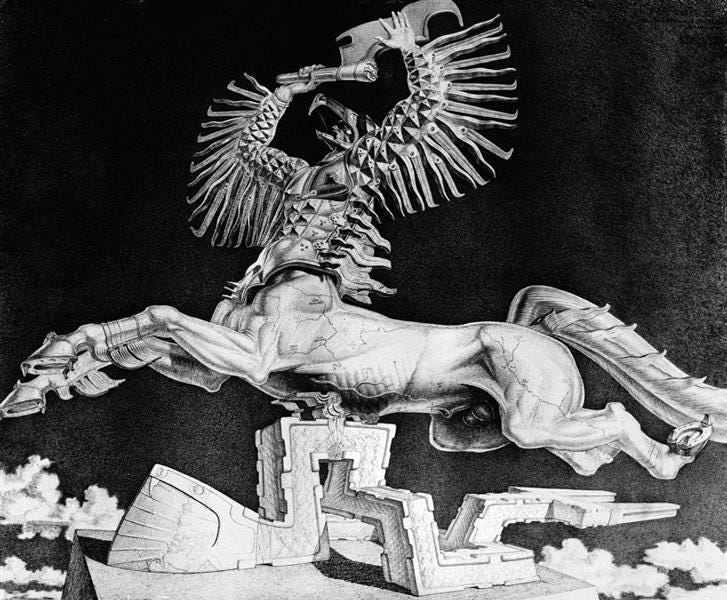Wednesday morning, starting around six-thirty, I thought a lot about war. Better said, I felt a lot about war, my insides jangling.
It started when I sat down to write, but got sucked into reading an article about Pete Hegseth. I read another article about Pete Hegseth. I read half a dozen more articles, which became a dozen more articles. About this man, buffoon man, insecure, unqualified cartoon man—my reading went on for about an hour and a half, until my thoughts were spinning, nerves whirring.
Feeling frustrated and angry.
Feeling unnerved.
The fact of his appointment, the playing out of his tenure in article after article, seeming like an undulating march of sadomasochism, like death drive incarnate.
Feeling deeply unsettled.
I did my usual things. Drank some coffee, made a pot of tea. Meditated for twenty minutes, then read some Hannah Arendt. And tried to get back to my writing: I had my quota to meet on the novel manuscript, the daily thousand-words minimum—but I couldn’t do much of anything.
Feeling furious and disconnected.
Powerless and sad.
Two hours turned into three, with a vivid palpitation in my chest, a desire to leap out of my skin. At the same time, I couldn’t bring myself to step away from the desk.
Around the four-hour mark, I noticed how much time had passed and felt disgusted with myself. Heavy winds blew outside. It occurred to me I could go for a walk, I said it out loud, I can go for a walk.
I put on my sneakers, stored my phone in a drawer, and headed outside.
And started, after maybe a mile, to feel a little more calm, if nothing else.
Rarely does the news work on me this way. Five days a week, going now for twenty-plus years, I spend about two hours in the early hours closely reading and summarizing the news for my other newsletter, TMN. And maybe imbibing that much information over time has led to a certain detachment from events when they’re not in my backyard—also coupled with a lifelong sense, from somewhere deep inside my psyche, that human history is long, the universe extremely longer, and my own time and role here small. So, news about Ukraine and Gaza, Sudan and Ethiopia—I have my opinions, my own read, and immense sympathy for the suffering. But digesting stories about my own government, the government a lot of my fellow citizens elected (including many people I know) wanting, for example, to use the military against its own civilians (again). Actively deploying the military against its own civilians (again), with future intentions to conduct training exercises in major cities, using civilians as the enemy—
Exhausted and disgusted.
All while I’m abroad, thousands of miles away.
This is a newsletter about beautiful things, and I do not experience agitation as anything beautiful. A mile-plus into the walk, on a gravel trail through trees, I was still upset. I picked up a rock, squeezed the sharp end into my palm. It hurt—good. Then an idea occurred to me: I asked myself, what do you believe in?
That’s when things finally started to turn around.
I spent another mile or so, walking fast, listing things out loud that I believe in, my immovable principles. There aren’t many, actually, I’m pretty flexible and open to argument, curious about people’s ways of moving through the world. But some things, at least by my own compass, only go one way.
And that’s when I started to feel better. The walk became a run, about six miles total. I returned and washed the dishes. Dropped to the floor and did my calisthenics, stretched, and took a cold shower. I sent a message to a friend asking about his health, an email to my mother suggesting we catch up on the phone. I opened the laptop, gave some money to a small organization doing good things, then sat down and wrote this newsletter, having reached a stillness, even a resonant one.
Action as antidote. Action as antitoxin.
I wonder if maybe some of the beauty in being active, pursuing small steps, is that it can feel like a cure. As Octavia E. Butler wrote, “So be it. See to it.” Action as balm.
The next day, the writing went great.
Hi. I’m able to write these meditations thanks to premium subscribers.
Level up for just $6 per month and enjoy tomorrow’s supplement for supporters with three-plus things to love: new music, great books, interesting fashion, cool stuff generally.
Tomorrow’s three-plus things—
A terrific noir thriller from 1949 for your next movie night
My favorite soothing podcast when I’m having a hard time falling asleep
Some witty advice on making and retaining friends
𓀠 No joke, premium subscribers make all of this possible.
❀ Hey, if you’re a writer looking for help—editing, coaching, brainstorm juju—I highly recommend collaborating with Rachel Knowles.
Rachel has helped me significantly, not to mention a lot of other writers: novelists, screenwriters, Substack-ers, the gamut.
Whether you’re aspiring or established, everyone needs an editor. More info at her website.
What the what
“Meditations in an Emergency” is a weekly essay from author Rosecrans Baldwin about something beautiful. Paying subscribers receive a Sunday supplement with three-plus things to love, plus a monthly travel-lust ballyhoo.
Rosecrans is a correspondent for GQ, a contributor at Travel + Leisure, and the bestselling author of Everything Now: Lessons From the City-State of Los Angeles, winner of the California Book Award. Other books include The Last Kid Left and Paris, I Love You but You’re Bringing Me Down. His debut novel, You Lost Me There, was a New York Times Book Review Editors’ Choice.
For books, articles, bio, contact info: rosecransbaldwin.com.


